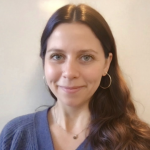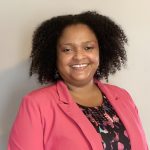CISWH’s graduate and doctoral fellows program prepares future social work and public health leaders for meaningful careers that directly impact the health and well-being of populations throughout the United States and the world.
Our fellows contribute to CISWH by:
- creating policy briefs
- conducting qualitative and quantitative research
- strategic planning
- storytelling and graphic design
- and much more!
Fellows also receive valuable opportunities to support and learn from each other while sharing their work with CISWH, BUSSW, BU, and the world at large.
Learn how you can support future social work leaders here. Are you a BU social work or public health student? Learn more about future fellowship opportunities here.
Abdul “Haseeb” Hamza (he/him)
MSW’25
Haseeb is an MSW student pursuing the clinical track at the Boston University School of Social Work. He is very passionate about bridging gaps in services for marginalized populations. He also cares about creating culturally appropriate and trauma-informed assessment and treatment tools for people with mental health needs. His undergraduate education was in Chemistry, Social Action/Social Change, and Psychology, which he is looking forward to integrating in the field of public health social work. Through his work at CISWH, Haseeb hopes to support advances in health equity and bring awareness about social determinants of health to both healthcare settings and the populations he is passionate about serving.
 Zoe Richman (she/her)
Zoe Richman (she/her)
MSW’25
Zoë Richman holds a B.A. in Health: Science, Society, and Policy with a minor in Politics, from Brandeis University. Zoë is an MSW student at Boston University. Before pursuing her MSW, she worked in electoral politics at the intersection of digital fundraising and organizing. She is excited to merge her organizing and people-management experience with her interests in compassionate, therapeutic care and health inequity.
 Jennica Allen (she/her)
Jennica Allen (she/her)
DrPH’27
Jennica Allen is the Manager of Community Engagement Practices within the Bureau of Community Health and Prevention at the Massachusetts Department of Public Health. She has coordinated the Division’s statewide chronic disease efforts, overseen the Massachusetts Partnership for Health Promotion and Chronic Disease Prevention and currently provides leadership to the Bureau’s community health planning initiatives with health care systems and community organizations focusing on capacity building for community engagement and social determinant of health investing and strategy implementation. Jennica has been a participant in the Bureau’s Racial Equity Movement since its early days and in this capacity, leads affinity work, participates in core training, and serves as a member of the Racial Equity Leadership Team. In 2021, the deBeaumont Foundation named Jennica one of the 40 Under 40 Leaders in Public Health. She received her Master of Public Health from Boston University School of Public Health with a concentration in Social and Behavioral Sciences. Jennica is a proud child of the city of Boston.
 Kimberly Baling (she/they)
Kimberly Baling (she/they)
MSW’25/MPH’26
Kimberly Baling holds a BA in Psychology from the University of Houston. Kimberly is an MSW student at Boston University, on the clinical track with a macro minor. She has worked with a variety of populations including children and adolescents in an inpatient and community based setting, and most recently a Community Mental Health Center (CMHC) grant focused on individuals living with serious mental illness, the Deaf and Hard of Hearing population, and those experiencing homelessness. Kimberly’s passions and interests are centered around accessibility, equitable, holistic care and using a trauma-informed, intersectional lens in approaching her work. Kimberly is excited to be working with CISWH, and to have the opportunity to provide support in working towards large scale systemic change.
Claudine is a doctoral candidate in Health Services Policy & Research at the School of Public Health at Boston University. She is interested in the investigation and implementation of evidence-based programs in health services to reduce health disparities. As such, her research has spanned from HIV prevention and sexual and reproductive health to maternal health and sickle cell disease. Her primary and current research focuses on sickle cell disease and access to quality care. Claudine received her Master’s in Public Health Policy and Management from New York University. There she began her career in research as an associate research scientist and interim project coordinator on a CDC-funded research study on HIV prevention and sexual health. Drawing on her past, present, and future research and experiences, Claudine is excited to join CISWH to help improve health systems and mitigate many of the social health injustices that migrants face. Claudine is also a proud Haitian American!
Melanie Morris, LCSW, is a doctoral candidate at the Boston University School of Social Work. She received a Master of Science in Social Work (MSSW) from Columbia University School of Social Work. Using mixed methods, her research focuses on the structural and social determinants of oral health among the Latino/a/e community and social work integration in oral health settings to improve oral health practice, policy, and patient outcomes. Her practice experience includes integrating clinical social work in dental school classrooms and clinics.
Edima Ottoho, MBA, MPH, PMP, is a Doctor of Public Health (DrPH) candidate in Leadership, Management, and Policy at Boston University School of Public Health. Edima has led numerous public health initiatives, including those focused on HIV/AIDS, Malaria, OVC, digital health, and health system strengthening in LMICs. Her expertise includes program design, planning, implementation coordination, budgeting, evaluation, and capacity development. She has worked across different health system tiers in nonprofit, private, and government sectors. Edima is a member of the Association of State and Territorial Health Officials (ASTHO) Community Health & Prevention Policy Committee (2024-2025), which provides policy direction for ASTHO on broad-based health promotion and prevention initiatives. She also worked with the Massachusetts Department of Public Health, co-developing health equity guidelines now used by local health departments. Edima has been recognized with the 2023 40-under-40 Public Health Catalyst Award by the Boston Congress of Public Health (BCPH) and the Equity and Inclusion Award by the Association of Public Policy Analysis and Management (APPAM). She has held fellowships with the Elinor Ostrom and Frederick Bastiat programs. As a board member of Smile Train’s Young Leadership Circle (YLC), she advocates for children affected by cleft worldwide. Edima aspires to be a compassionate, conscientious, and committed global health leader, driving equitable health policies and programs.
Sheila is pursuing an MSW at BU School of Social Work on the clinical track, with a focus on trauma-based assessment and treatment, substance use disorder and narrative therapy. She brings her experience working in research and analysis, particularly in environmental and energy policy. As a policy fellow she contributes to the Beyond 2025 Action Hub, working on data, research and policy analysis. Sheila is excited for the opportunity to work alongside the people in the CISWH family, striving toward justice and health equity.
Matty Hammon holds a B.A. in Psychology and Human Development from the State University of New York at Albany. She is currently pursuing her MSW on the macro track at Boston University. She is passionate about increasing access to care for vulnerable and marginalized communities; in particular, Matty hopes to work with LGBTQ+ adults to build sustainable support to combat isolation and create more accessible avenues to receive care. She is excited to combine her clinical experience with systems-level change to better meet people where they are at and work collaboratively to create and meet these goals.
Jess is a current MSW student studying clinical social work at Boston University. She holds a B.S. in Sociology from Bridgewater State University. She is a member of the Monomoy Regional School Committee, representing the Town of Chatham where she chairs the negotiations committee and superintendent evaluation committee. Although Jess has experience working with all ages, she is focused on aging. As a policy fellow, she contributes to the Beyond 2025 Action Hub. Jess is excited to be a member of the CISWH community, and a part of this incredible team of really good people doing really good work.
 Molly Heald (she/her)
Molly Heald (she/her)








